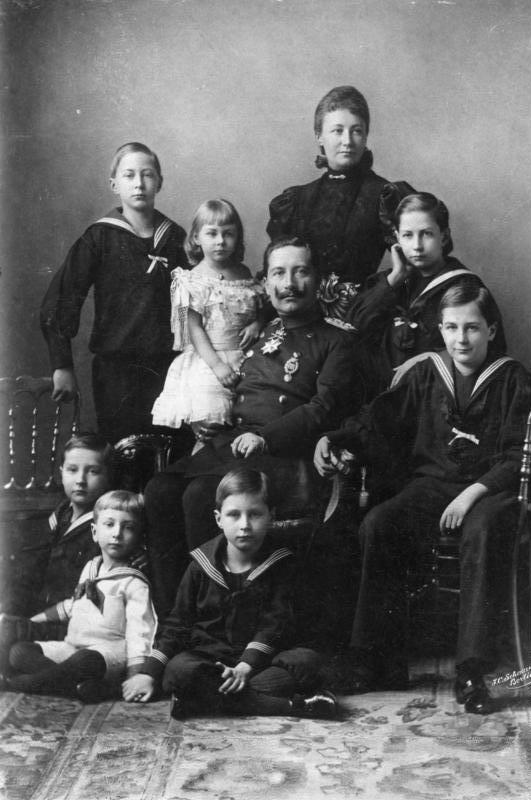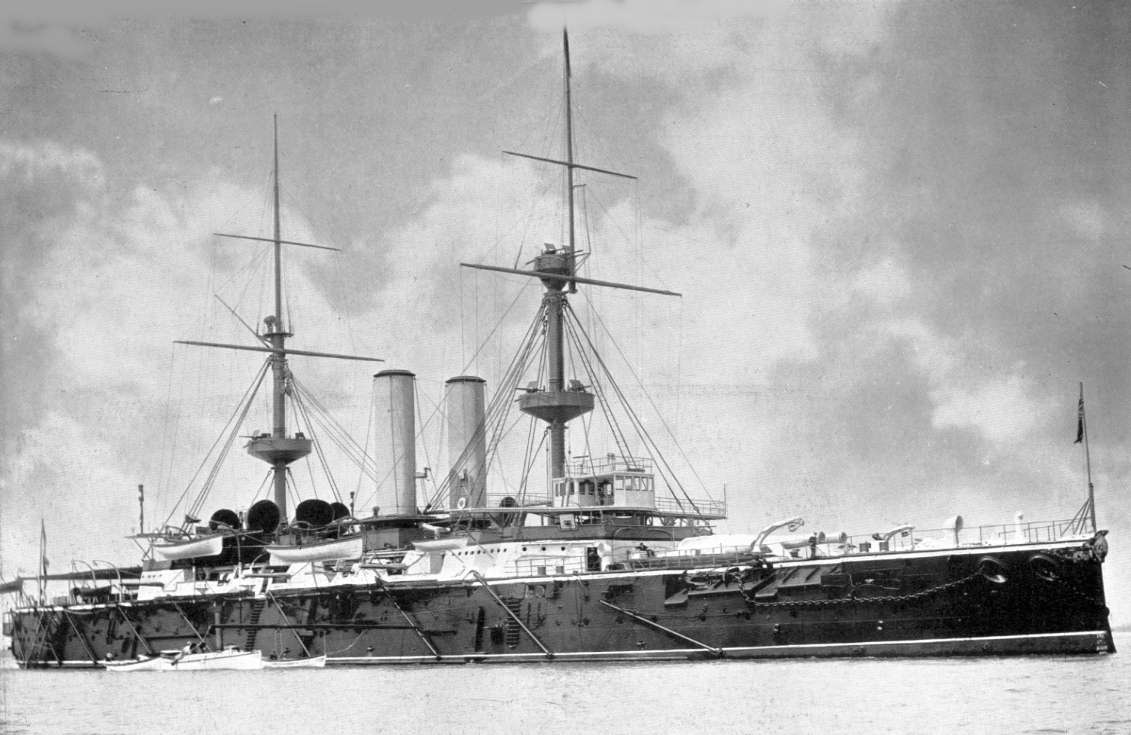|
German Naval Laws
The Naval Laws (german: Flottengesetze, "Fleet Laws") were five separate laws passed by the German Empire, in 1898, 1900, 1906, 1908, and 1912. These acts, championed by Kaiser Wilhelm II and his Secretary of State for the Navy, Grand Admiral Alfred von Tirpitz, committed Germany to building up a navy capable of competing with the Royal Navy of the United Kingdom. German desires and the strategic debate The Kaiser had long wanted a large naval force to assure Germany of what he called " a place in the sun". A large German navy could assist in German attempts to attain colonies, as well as further the country's economic and commercial interests elsewhere in the world. He was determined to make his country a colonial power in Africa and the Pacific. He was also a very militaristic man, and wished to increase the strength of the German armed forces; in particular he wanted to develop a navy that could match the British Royal Navy. As he wrote in his autobiography: Though Wilhel ... [...More Info...] [...Related Items...] OR: [Wikipedia] [Google] [Baidu] |
German Empire
The German Empire (),Herbert Tuttle wrote in September 1881 that the term "Reich" does not literally connote an empire as has been commonly assumed by English-speaking people. The term literally denotes an empire – particularly a hereditary empire led by an emperor, although has been used in German to denote the Roman Empire because it had a weak hereditary tradition. In the case of the German Empire, the official name was , which is properly translated as "German Empire" because the official position of head of state in the constitution of the German Empire was officially a "presidency" of a confederation of German states led by the King of Prussia who would assume "the title of German Emperor" as referring to the German people, but was not emperor of Germany as in an emperor of a state. –The German Empire" ''Harper's New Monthly Magazine''. vol. 63, issue 376, pp. 591–603; here p. 593. also referred to as Imperial Germany, the Second Reich, as well as simply Germany, ... [...More Info...] [...Related Items...] OR: [Wikipedia] [Google] [Baidu] |
Algeciras Conference
The Algeciras Conference of 1906 took place in Algeciras, Spain, and lasted from 16 January to 7 April. The purpose of the conference was to find a solution to the First Moroccan Crisis of 1905 between France and Germany, which arose as Germany responded to France's effort to establish a protectorate over the independent state of Morocco. Germany was not trying to stop French expansion. Its goal was to enhance its own international prestige, and it failed badly. The result was a much closer relationship between France and Britain, which strengthened the Entente Cordiale since both London and Paris were increasingly suspicious and distrustful of Berlin. An even more momentous consequence was the heightened sense of frustration and readiness for war in Germany. It spread beyond the political elite to much of the press and most of the political parties except for the Liberals and Social Democrats on the left. The Pan-German element grew in strength and denounced their government's r ... [...More Info...] [...Related Items...] OR: [Wikipedia] [Google] [Baidu] |
Entente Cordiale
The Entente Cordiale (; ) comprised a series of agreements signed on 8 April 1904 between the United Kingdom and the French Republic which saw a significant improvement in Anglo-French relations. Beyond the immediate concerns of colonial demarcation addressed by the agreement, the signing of the Entente Cordiale marked the end of almost a thousand years of intermittent conflict between the two states and their predecessors, and replaced the ''modus vivendi'' that had existed since the end of the Napoleonic Wars in 1815 with a more formal agreement. The Entente Cordiale represented the culmination of the policy of Théophile Delcassé (France's foreign minister from 1898 to 1905), who believed that a Franco-British understanding would give France some security in Western Europe against any German system of alliances (see Triple Alliance (1882)). Credit for the success of the negotiation of the Entente Cordiale belongs chiefly to Paul Cambon (France's ambassador in London ... [...More Info...] [...Related Items...] OR: [Wikipedia] [Google] [Baidu] |
Materiel
Materiel (; ) refers to supplies, equipment, and weapons in military supply-chain management, and typically supplies and equipment in a commercial supply chain context. In a military context, the term ''materiel'' refers either to the specific needs (excluding manpower) of a force to complete a specific mission, or the general sense of the needs (excluding manpower) of a functioning army. An important category of materiel is commonly referred to as ordnance, especially concerning mounted guns (artillery) and the shells it consumes. Along with fuel, and munitions in general, the steady supply of ordnance is an ongoing logistic challenge in active combat zones. Materiel management consists of continuing actions relating to planning, organizing, directing, coordinating, controlling, and evaluating the application of resources to ensure the effective and economical support of military forces. It includes provisioning, cataloging, requirements determination, acquisition, distrib ... [...More Info...] [...Related Items...] OR: [Wikipedia] [Google] [Baidu] |
Boers
Boers ( ; af, Boere ()) are the descendants of the Dutch-speaking Free Burghers of the eastern Cape frontier in Southern Africa during the 17th, 18th, and 19th centuries. From 1652 to 1795, the Dutch East India Company controlled this area, but the United Kingdom incorporated it into the British Empire in 1806. The name of the group is derived from "boer", which means "farmer" in Dutch and Afrikaans. In addition, the term also applied to those who left the Cape Colony during the 19th century to colonise in the Orange Free State, Transvaal (together known as the Boer Republics), and to a lesser extent Natal. They emigrated from the Cape to live beyond the reach of the British colonial administration, with their reasons for doing so primarily being the new Anglophone common law system being introduced into the Cape and the British abolition of slavery in 1833. The term ''Afrikaners'' or ''Afrikaans people'' is generally used in modern-day South Africa for the white Afri ... [...More Info...] [...Related Items...] OR: [Wikipedia] [Google] [Baidu] |
Second Boer War
The Second Boer War ( af, Tweede Vryheidsoorlog, , 11 October 189931 May 1902), also known as the Boer War, the Anglo–Boer War, or the South African War, was a conflict fought between the British Empire and the two Boer Republics (the South African Republic and the Orange Free State) over the Empire's influence in Southern Africa from 1899 to 1902. Following the discovery of gold deposits in the Boer republics, there was a large influx of "foreigners", mostly British from the Cape Colony. They were not permitted to have a vote, and were regarded as "unwelcome visitors", invaders, and they protested to the British authorities in the Cape. Negotiations failed and, in the opening stages of the war, the Boers launched successful attacks against British outposts before being pushed back by imperial reinforcements. Though the British swiftly occupied the Boer republics, numerous Boers refused to accept defeat and engaged in guerrilla warfare. Eventually, British scorched eart ... [...More Info...] [...Related Items...] OR: [Wikipedia] [Google] [Baidu] |
Social Democratic Party Of Germany
The Social Democratic Party of Germany (german: Sozialdemokratische Partei Deutschlands, ; SPD, ) is a centre-left social democratic political party in Germany. It is one of the major parties of contemporary Germany. Saskia Esken has been the party's leader since the 2019 leadership election together with Lars Klingbeil, who joined her in December 2021. After Olaf Scholz was elected chancellor in 2021 the SPD became the leading party of the federal government, which the SPD formed with the Greens and the Free Democratic Party, after the 2021 federal election. The SPD is a member of 11 of the 16 German state governments and is a leading partner in seven of them. The SPD was established in 1863. It was one of the earliest Marxist-influenced parties in the world. From the 1890s through the early 20th century, the SPD was Europe's largest Marxist party, and the most popular political party in Germany. During the First World War, the party split between a pro-war mainstream ... [...More Info...] [...Related Items...] OR: [Wikipedia] [Google] [Baidu] |
Naval Defence Act 1889
The Naval Defence Act 1889 was an Act of the Parliament of the United Kingdom. It received the Royal Assent on 31 May 1889 and formally adopted the "two-power standard" and increased the United Kingdom's naval strength. The standard called for the Royal Navy to maintain a number of battleships at least equal to the combined strength of the next two largest navies in the world, which then were France and Russia. An extra £20 million over the following four years were provided for ten new battleships, thirty-eight new cruisers, eighteen new torpedo boats and four new fast gunboats. The two-power standard was maintained until disarmament began during the inter-war period. Background It was passed under the government of Lord Salisbury and facilitated spending £21,500,000 over five years toward fleet expansion. Initially, Parliament opposed the increase in naval expenditures for several reasons. Expert naval opinions presented to Parliament in December 1888 and February 1889 ren ... [...More Info...] [...Related Items...] OR: [Wikipedia] [Google] [Baidu] |
Two-Power Standard
The official history of the Royal Navy reached an important juncture in 1707, when the Act of Union merged the kingdoms of England and Scotland into the Kingdom of Great Britain, following a century of personal union between the two countries. This had the effect of merging the Royal Scots Navy into the Royal Navy. The Navy grew considerably during the global struggle with France that had started in 1690 and culminated in the Napoleonic Wars, a time when the practice of fighting under sail was developed to its highest point. The ensuing century of general peace saw Britain virtually uncontested on the seas, and considerable technological development. Sail yielded to steam and cannon supplanted by large shell-firing guns, and ending with the race to construct bigger and better battleships. That race, however, was ultimately a dead end, as aircraft carriers and submarines came to the fore and, after the successes of World War II, the Royal Navy yielded its formerly preeminent plac ... [...More Info...] [...Related Items...] OR: [Wikipedia] [Google] [Baidu] |
Alfred Von Tirpitz-2
Alfred may refer to: Arts and entertainment *''Alfred J. Kwak'', Dutch-German-Japanese anime television series * ''Alfred'' (Arne opera), a 1740 masque by Thomas Arne * ''Alfred'' (Dvořák), an 1870 opera by Antonín Dvořák *"Alfred (Interlude)" and "Alfred (Outro)", songs by Eminem from the 2020 album ''Music to Be Murdered By'' Business and organisations * Alfred, a radio station in Shaftesbury, England *Alfred Music, an American music publisher * Alfred University, New York, U.S. *The Alfred Hospital, a hospital in Melbourne, Australia People * Alfred (name) includes a list of people and fictional characters called Alfred * Alfred the Great (848/49 – 899), or Alfred I, a king of the West Saxons and of the Anglo-Saxons Places Antarctica * Mount Alfred (Antarctica) Australia * Alfredtown, New South Wales * County of Alfred, South Australia Canada * Alfred and Plantagenet, Ontario * Alfred Island, Nunavut * Mount Alfred, British Columbia United States * Alfred, Mai ... [...More Info...] [...Related Items...] OR: [Wikipedia] [Google] [Baidu] |




